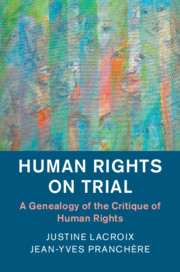Book contents
- Human Rights on Trial
- Human Rights in History
- Human Rights on Trial
- Copyright page
- Contents
- Acknowledgements
- Introduction: From the Rights of Man to Human Rights?
- 1 Critiques of Human Rights in Contemporary Thought
- 2 Human Rights against Inheritance
- 3 Human Rights versus Social Utility
- 4 Human Rights against the Rights of God
- 5 The Rights of Man against Human Emancipation
- 6 Human Rights against Politics
- 7 The ‘right to have rights’
- Conclusion: Towards a Political Understanding of Human Rights
- Index
4 - Human Rights against the Rights of God
A Theologico-Political Critique: Louis de Bonald and Joseph de Maistre
Published online by Cambridge University Press: 18 May 2018
- Human Rights on Trial
- Human Rights in History
- Human Rights on Trial
- Copyright page
- Contents
- Acknowledgements
- Introduction: From the Rights of Man to Human Rights?
- 1 Critiques of Human Rights in Contemporary Thought
- 2 Human Rights against Inheritance
- 3 Human Rights versus Social Utility
- 4 Human Rights against the Rights of God
- 5 The Rights of Man against Human Emancipation
- 6 Human Rights against Politics
- 7 The ‘right to have rights’
- Conclusion: Towards a Political Understanding of Human Rights
- Index
Summary
- Type
- Chapter
- Information
- Human Rights on TrialA Genealogy of the Critique of Human Rights, pp. 127 - 156Publisher: Cambridge University PressPrint publication year: 2018



